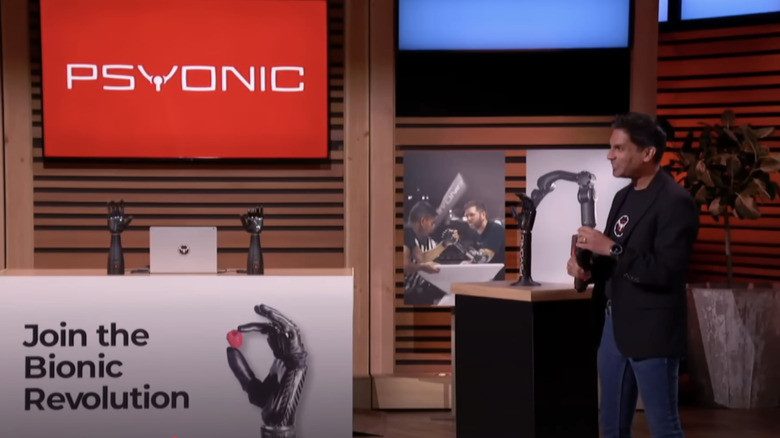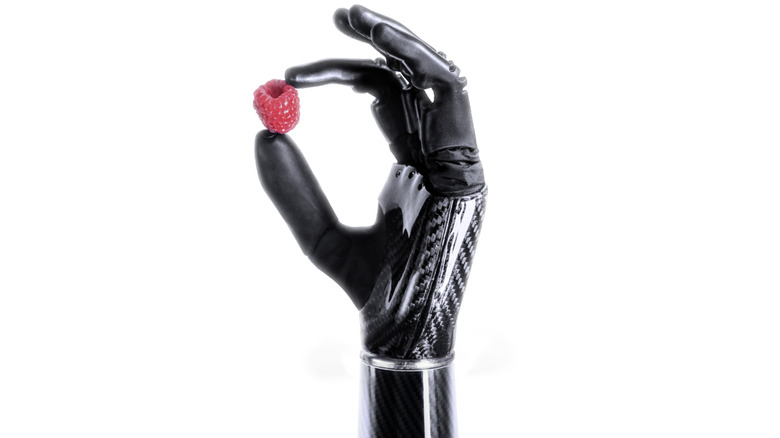What Happened To The Psyonic Bionic Hand From Shark Tank Season 15?
Dr. Aadeel Akhtar realized his life's mission early on when he went to visit his parents' native land of Pakistan. During his visit, Akhtar, who was only 7 years old at the time, met a girl of his age who was living in poverty and missing a leg. To function normally, the girl used a tree branch as a crutch. The sight profoundly impacted Akhtar, inspiring him to dedicate his life to advancing the prosthetics industry.
Akhtar went on to earn degrees in biology, computer science, mechanical engineering, electrical engineering, and neuroscience, in addition to attending medical school. His expertise and passion culminated in him founding Psyonic and creating the Ability Hand, a revolutionary bionic prosthetic. Aside from regaining hand function, the device features multi-touch feedback sensors that allow users to experience a sense of touch, similar to an artificial skin developed by Stanford University researchers.
Since founding Psyonic in 2015, Akhtar has worked tirelessly to make the Ability Hand accessible and affordable. By using cost-effective materials and ensuring Medicare coverage, the firm has drastically reduced the financial barrier for patients by bringing the price of the prosthetic down to between $10,000 and $20,000. Despite these advances, Psyonic's production capacity was limited at 100 per year, and this prompted its founder to seek additional funding. This led him to ABC's hit business reality series "Shark Tank," where he hoped to secure a $1 million investment to scale production. Akhtar secured a partnership with three sharks at his target valuation, and continues to develop his groundbreaking prosthetics.
What happened to Psyonic on Shark Tank?
In February 2024, Akhtar appeared in Episode 16 of "Shark Tank" Season 15 to pitch his company and its flagship product, the Ability Hand. Akhtar sought a $1 million investment in exchange for 2% equity, valuing his then 9-year-old company at $50 million. He explained the challenges Psyonic faced throughout the years. He expressed particular concern for meeting growing demand for the Ability Hand, which sold for $15,500 but cost $1,800 to make, according to Shark Tank Blog. The Ability Hand uses electromyography (EMG) sensors to control movement, similar to a magnetic prosthetic movement technology developed at MIT.
During his pitch of the Ability Hand, Akhtar introduced Sergeant Anderson, a veteran who lost his arm in Iraq. Anderson described how the device had significantly improved his quality of life compared to other prosthetics, which were often too heavy, slow, or uncomfortable. Akhtar also asked him to demonstrate how durable and strong the arm was by making him punch through a wooden panel. The Sharks were instantly impressed after the demonstration.
However, some things did not add up for some Sharks while listening to Akhtar's projections and disclosure of figures. Mark Cuban, who is leaving the Shark Tank after Season 16, expressed skepticism about Psyonic's crowdfunding campaign, which had raised $3.1 million on StartEngine. He questioned why venture capital firms hadn't invested if the technology was as revolutionary as Ahktar claimed. Robert Herjavec found the project promising, but declined to make an offer.
Kevin O'Leary, Lori Greiner, and Daymond John showed greater interest. O'Leary initially offered $1 million for 10% equity, which Akhtar rejected. After some back and forth, the trio proposed a revised deal: $1 million for 6% equity, split evenly among them. The equity structure included common shares and advisory shares, preserving Psyonic's $50 million valuation. In the end, Akhtar gladly accepted the deal.
What's next for Psyonic and its founder?
Since its "Shark Tank" appearance, Psyonic has achieved remarkable growth. Although the deal with the Sharks is still in progress, the company's visibility and credibility have soared. In May 2024, Psyonic partnered with EastPoint Prosthetics & Orthotics and Advanced 3D, Inc., to produce custom prosthetic sockets for Akhtar's invention. The move is expected to improve the Ability Hand's accessibility and affordability.
By June 2024, Psyonic's valuation had risen to $65.07 million. The company has since expanded its team to 30 full-time employees and more than doubled its revenue from the previous year. During Akhtar's time on the show, which aired in March 2024, he announced that Psyonic's production capacity was set to increase significantly in 2025, with plans to produce 500 units annually.
Even before "Shark Tank," Psyonic already garnered interest from prestigious organizations like NASA and Meta. After its TV appearance, it earned more recognition, with the Ability Hand being recognized as one of the best innovations at a recent Consumer Electronics Show. In 2021, Newsweek named Akhtar one of the nation's 50 top disruptors.
In January 2025, Akhtar reflected on Psyonic's progress with gratitude. In an Instagram post celebrating his 38th birthday, he shared milestones such as raising $4.1 million in a seed funding round, launching the Ability Fund for patients in need, and receiving honors from the nonprofit King Center. With more ambitious plans ahead, Psyonic and its founder are poised to advance the prosthetics industry even further.


